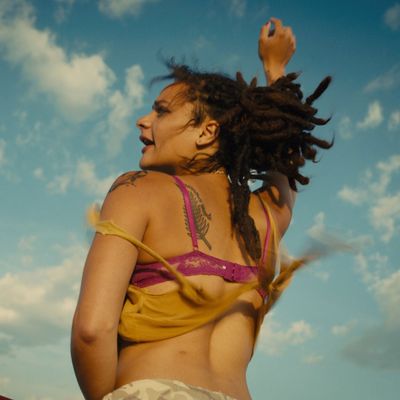
The vérité nonfiction director arrives on the scene as a visitor, allowing the subjects to determine the action, while the fiction director maps out parameters and shapes a story line. In the work of the British-born filmmaker Andrea Arnold, the two types of directing merge. Unprofessional actors anchor her projects. She discovered the leading lady of Fish Tank on a train platform screaming at an uncooperative boyfriend. She found the central actress, Sasha Lane, of her new film, American Honey, on a beach. This stuff makes a great publicity hook, but think of the risk of putting a film in the hands of untested performers and functioning in part as an observer on one’s own movie. In this case (as in Fish Tank), the payoff is so huge you feel the medium is expanding before your eyes.
Arnold was drawn to a real group of teenagers who — under the management of a den father/Fagin — traveled in a bus around the U.S. selling magazine subscriptions door-to-door and, in the evenings, partying hard. My initial hope that American Honey would make a case for the essential role of print magazines in a world that devalues them was quickly dashed. These kids have no connection with what they’re selling. They’re just selling. Really, they’re spieling. They say, for example, that they’re formerly wayward youth pulling themselves up by the old bootstraps and trying to pay for college. Each day they return to the fold and turn over a substantial part of their earnings to Krystal (Riley Keough), who doesn’t just embody capitalism at its least sentimental — she constantly reminds her employees of that fact. You sell or you’re cast adrift.
Star (Lane) had been caring for two young siblings in the home of a seriously creepy stepfather. In the first scene, she’s sifting through a trash can for expired foodstuffs. When the van full of rowdies goes by, she gazes on it longingly — and on one flamboyantly flirty stud, Jake (Shia LaBeouf), with naked desire. She abandons her sister and brother — a wrenching moment, reminiscent of Fish Tank — and hops aboard that bus. The kids (most played by nonactors that Arnold found in the milieu) roll on the ground and playfully punch one another; they’re a blur of unharnessed energy. Star is transported in more ways than one.
Lane is everything Arnold must have hoped she’d be. The longing is in her eyes, but her mouth, with its thick upper lip, suggests skepticism and a healthy self-possession. Star’s only loss of control is around Jake. If you think LaBeouf is a joke, you need to see him here. There’s wildness there, but acting centers him. He’s magnetizing. Keough — the granddaughter of Elvis and Priscilla — has a soft face but hard eyes. Krystal has a fascinating strategy: She gives her charges the illusion of freedom.
One thing you notice when Star passes her little siblings onto their mother, who’s usually found in a bar: The woman — who doesn’t want the responsibility of parenthood — isn’t on a stool, soused. She’s rehearsing an intricate line dance. Again and again, Arnold seeks out things about people that don’t fit your expectations. When, in the Southwest, Star has a fight with Jake and jumps into a classic convertible with three middle-aged men (one is played by Will Paton) in ten-gallon hats, they clearly can’t believe their luck at having this teenage cutie (drinking copious amounts of mezcal) to themselves. You wait for them to turn predatory, and maybe they will. Or maybe they won’t. Might happen, might not. In any case, they’re not predators. No character is fixed. No character is really a character. It’s like they all were waiting for Arnold to find them and put them on film.
*This article appears in the September 19, 2016, issue of New York Magazine.


